

How the US has hidden its empire. There aren’t many historical episodes more firmly lodged in the United States’s national memory than the attack on Pearl Harbor.
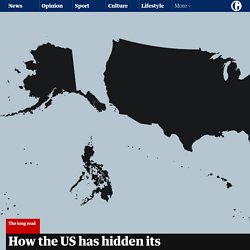
It is one of only a few events that many people in the country can put a date to: 7 December 1941, the “date which will live in infamy,” as Franklin D Roosevelt put it. Hundreds of books have been written about it – the Library of Congress holds more than 350. And Hollywood has made movies, from the critically acclaimed From Here to Eternity, starring Burt Lancaster, to the critically derided Pearl Harbor, starring Ben Affleck.
But what those films don’t show is what happened next. Nine hours after Japan attacked the territory of Hawaii, another set of Japanese planes came into view over another US territory, the Philippines. The attack on Pearl Harbor was just that – an attack. Contrary to popular memory, the event familiarly known as “Pearl Harbor” was in fact an all-out lightning strike on US and British holdings throughout the Pacific. How the US has hidden its empire. There aren’t many historical episodes more firmly lodged in the United States’s national memory than the attack on Pearl Harbor.

It is one of only a few events that many people in the country can put a date to: 7 December 1941, the “date which will live in infamy,” as Franklin D Roosevelt put it. Hundreds of books have been written about it – the Library of Congress holds more than 350. And Hollywood has made movies, from the critically acclaimed From Here to Eternity, starring Burt Lancaster, to the critically derided Pearl Harbor, starring Ben Affleck. But what those films don’t show is what happened next. Nine hours after Japan attacked the territory of Hawaii, another set of Japanese planes came into view over another US territory, the Philippines. The attack on Pearl Harbor was just that – an attack. Contrary to popular memory, the event familiarly known as “Pearl Harbor” was in fact an all-out lightning strike on US and British holdings throughout the Pacific.
American Hegemony Is Here to Stay. IS RETREAT from global hegemony in America’s national interest?

No idea has percolated more widely over the past decade—and none is more bogus. The United States is not headed for the skids and there is no reason it should be. The truth is that America can and should seek to remain the world’s top dog. The idea of American hegemony is as old as Benjamin Franklin, but has its practical roots in World War II. The United States emerged from that war as the dominant economic, political and technological power. “Hegemony” is a word used by social scientists to describe leadership within a system of competing states. China's Superpower Status Not Enough To Replace U.S. As Global Leader (Yet) (JOHANNES EISELE/AFP/Getty Images) In hindsight, China’s international ascendance seems to fit well with the predictions of neorealist scholars like John Mearsheimer.
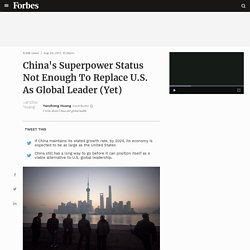
Back in 1974, Deng Xiaoping declared at the United Nations that “China is not, and will never become a superpower.” Today’s Chinese leaders might find what he said ill-timed and ill-advised. By the end of 2015, China saw its GDP reach $11.2 trillion, accounting for 15% of the world economy (U.S. share: 24.5%). If China maintains its stated growth rate, by 2024, its economy is expected to be as large as the United States '. The Futurist: Why the US Will Still be the Only Superpower in 2030, v2.0. One of the most popular dinner party conversation topics is the possibility that the United States will be joined or even surpassed as a superpower by another nation, such as China.
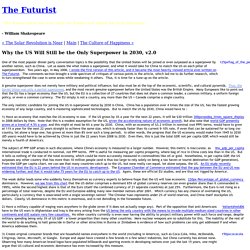
Let us assess the what makes a superpower, and what it would take for China to match the US on each pillar of superpowerdom. Two years ago, in May 2006, I wrote the first version of this article, and it became the most heavily viewed article ever written on The Futurist. The comments section brought a wide spectrum of critiques of various points in the article, which led me to do further research, which in turn strengthened the case in some areas while weakening it others.
Thus, it is time for a tune-up on the article. A genuine superpower does not merely have military and political influence, but also must be at the top of the economic, scientific, and cultural pyramids. THE UNITED STATES WILL REMAIN THE WORLD'S ONLY SUPERPOWER FOR DECADES TO COME. Why China Won't Overtake the United States. After two and a half decades, is the United States’ run as the world’s sole superpower coming to an end?
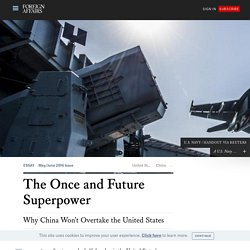
Many say yes, seeing a rising China ready to catch up to or even surpass the United States in the near future. By many measures, after all, China’s economy is on track to become the world’s biggest, and even if its growth slows, it will still outpace that of the United States for many years. Its coffers overflowing, Beijing has used its new wealth to attract friends, deter enemies, modernize its military, and aggressively assert sovereignty claims in its periphery. The United States, China and the Preferred Superpower. Forget China—the U.S. Is Still the Global Superpower. A ‘superpower’ is a country that wields enough military, political and economic might to convince nations in all parts of the world to do things they otherwise wouldn’t.
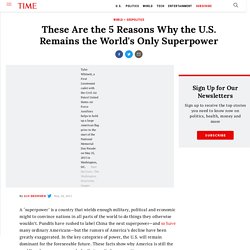
Pundits have rushed to label China the next superpower—and so have many ordinary Americans—but the rumors of America’s decline have been greatly exaggerated. In the key categories of power, the U.S. will remain dominant for the foreseeable future. These facts show why America is still the world’s only superpower, and why that won’t change anytime soon. 1. Economics.